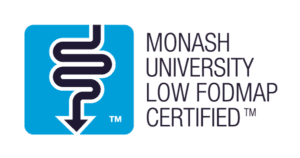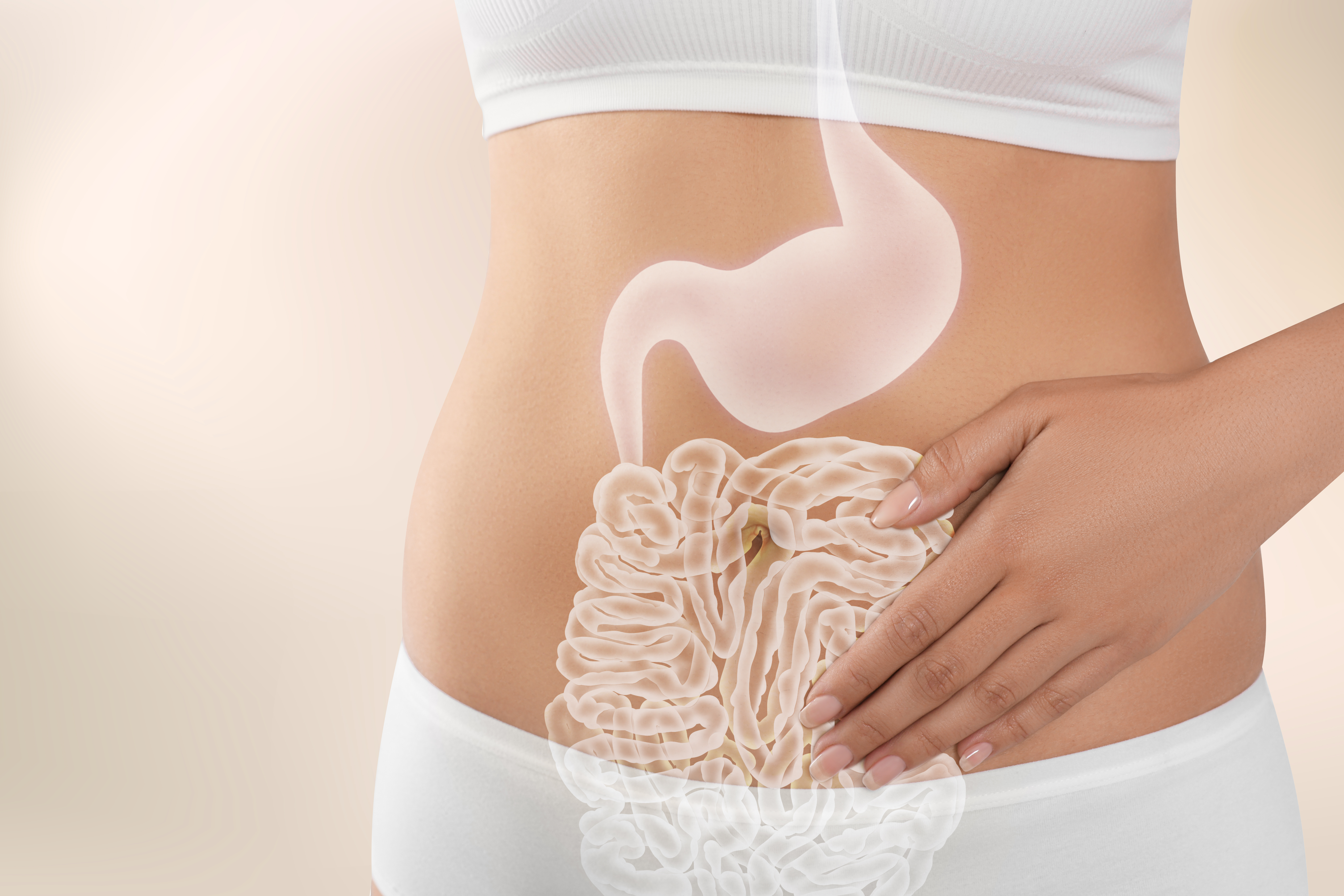What conditions are commonly associated with lactose intolerance?
Lactose intolerance is often connected with other gastrointestinal or autoimmune conditions such as IBS, coeliac disease, Crohn’s disease, and gastroenteritis. These conditions may either cause or worsen lactose intolerance by damaging the gut lining where lactase enzymes are produced.
While lactose intolerance can occur independently, it is often associated with other medical conditions that can affect your overall health and well-being. This is particularly the case where a separate condition causes damage to the villi in the gut, which is where lactase enzymes are produced.
Understanding these associations can help in recognising the dual impact of lactose intolerance and an underlying condition, as well as in managing lactose intolerance more effectively and recognising when additional medical attention may be needed. Below are some medical conditions commonly linked with lactose intolerance:
1. Irritable Bowel Syndrome (IBS)

People with lactose intolerance are often more likely to experience Irritable Bowel Syndrome (IBS), a chronic gastrointestinal disorder that affects the large intestine. IBS affects around 3 out of every 10 people, with females being more likely than males to be affected*. IBS shares many symptoms with lactose intolerance, such as abdominal pain, bloating, and irregular bowel movements. The exact cause of IBS is unknown, but it is believed to be related to a combination of factors, including:
- Abnormalities in the gut-brain interaction
- Intestinal muscle contractions
- Nervous system abnormalities
- Inflammation in the intestines
- Severe infection
- Changes in gut bacteria
There are no definitive medical tests for IBS but stool and blood tests may be required to rule out other possible causes for your symptoms. Diagnosis is typically based on symptoms. Foods that trigger IBS symptoms will vary for each person. Research has proven that following a low FODMAP diet for two to six weeks to help identify trigger foods is the most effective way of managing IBS. Three in four people see improvements in their symptoms after adopting a low FODMAP diet*. FODMAP stands for Fermentable Oligosaccharides, Disaccharides, Monosaccharides and Polyols. These are types of carbohydrate (sugar) found in various foods such as certain fruits, vegetables, grains, and dairy products, which are not well absorbed in the small intestine and lead to The The D (Disaccharides) in FODMAP specifically refers to Lactose – a sugar found in milk and dairy products. When lactose can’t be broken down due to a deficiency of lactase, the enzyme responsible for its digestion, it passes undigested into the colon and ferments producing gases. This fermentation process leads to symptoms such as bloating, gas, abdominal pain, and diarrhea. These symptoms collectively define lactose intolerance and can significantly impact an individual’s quality of life if not managed through dietary adjustments or lactase supplements.
Read how Monash Certified Lacteeze assists with low FODMAP diet on our blogs page.
*https://www.healthdirect.gov.au/irritable-bowel-syndrome-ibs
*https://dietitiansaustralia.org.au/health-advice/irritable-bowel-syndrome-ibs
2. Coeliac Disease
Coeliac disease is an autoimmune disorder where the ingestion of gluten leads to damage in the small intestine. This condition can interfere with nutrient absorption. The damage to the intestinal lining caused by coeliac disease can reduce lactase production, leading to secondary lactose intolerance. Once a person with celiac disease adopts a gluten-free diet, their ability to digest lactose may improve over time, but lactose intolerance can persist in some cases. Approximately 1 in 70 Australians have coeliac disease*.
* Coeliac disease – Coeliac Australia
3. Crohn’s Disease and Ulcerative Colitis
Crohn’s disease and ulcerative colitis are types of Inflammatory Bowel Disease (IBD) that cause chronic inflammation of the digestive tract leading to abdominal pain, severe diarrhoea, fatigue, weight loss, and malnutrition. The inflammation and damage caused by these diseases can result in a decrease in lactase production, leading to secondary lactose intolerance. Managing Crohn’s disease through medication, diet, and lifestyle changes can help heal the gut lining and can sometimes restore lactose digestion, but some individuals may continue to experience lactose intolerance.
4. Gastroenteritis
Gastroenteritis, commonly known as the stomach flu, can temporarily damage the lining of the intestines, leading to a temporary lactose intolerance. This form of lactose intolerance usually resolves once the intestinal lining heals. During recovery, it’s advisable to avoid lactose-containing foods to prevent discomfort.
5. Other Gastrointestinal Disorders
Several other gastrointestinal disorders, such as chronic pancreatitis and parasitic infections, can impair the digestion of lactose. Addressing the underlying condition can help improve lactose tolerance. It’s important to work with a healthcare professional to diagnose and treat any underlying gastrointestinal issues.
6. Osteoporosis
Lactose intolerance may increase the risk of Osteoporosis – a common, chronic disease when your bones become brittle and less dense. Lactose-intolerant individuals often avoid dairy products and primary sources of calcium leading to lower bone density and increased osteoporosis risk. The deficiency of lactase, the enzyme needed to digest lactose, also hampers calcium absorption. Additionally, avoiding dairy can result in deficiencies in other bone-health nutrients like vitamin D, further exacerbating the risk.
To mitigate this, lactose-intolerant individuals should consume non-dairy calcium sources such as leafy greens, fortified plant milks, nuts, seeds, and fish with bones. Supplementing with vitamin D and lactase enzymes can also improve calcium intake. Regular bone density check-ups and consultations with healthcare providers are essential for maintaining bone health and reducing the risk of Osteoporosis.
7. Colic
Colic is a condition that occurs within the first few months of birth in young babies who show significant periods of distress at predictable times of the day. In all other respects, the baby is well-fed and healthy, and no underlying cause has been found for the condition. In infants these colic symptoms are frequently caused by Colic associated with Lactose Intolerance.
Managing Lactose Intolerance and Associated Conditions
Effectively managing lactose intolerance involves more than just avoiding dairy products. It’s crucial to consider and address any associated conditions that may exacerbate symptoms. Read our tips for managing lactose intolerance and related conditions.
As the above conditions are all related to lactose intolerance, Lacteeze lactase enzymes can assist by addressing the symptoms of lactose intolerance Read about how Lacteeze works.








